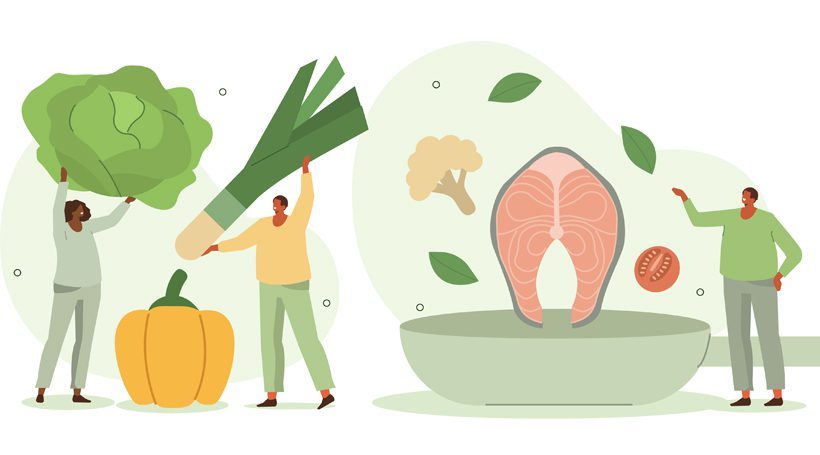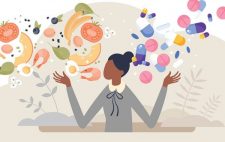When aches, pains and sprains come around, don’t just look in your medicine cabinet – look in your pantry.

Laura Ross, DO
“When I talk to patients, I let them know that treatments, surgeries, medications, exercise, physical therapy – it’s only a portion of care,” says Laura Ross, DO, founder of Ross Center for Orthopedics. “What you eat matters.”
When your diet supports your body, you’ll improve your overall health and decrease risk of disease – not to mention find better energy, sleep and mental focus. “Food,” she says, “really is medicine.”
Strong bones
Bone health depends on proper nutrition, and it’s more than just “drinking milk for strong bones.”
“Getting the proper nutrients, vitamins and minerals strengthens your bone density, which helps prevent injuries and speeds recovery,” says Ross.
The best way to get that edge isn’t from a pill. The mineral boron – which is found in coffee, apples, beans and potatoes – is great for bone health, as is the magnesium found in foods like almonds, peanuts and oatmeal.
“You also want foods that are rich in calcium and vitamin D,” she says. “Everyone thinks of milk, but oranges, salmon and low-fat cheese are also great.”
All of these diet changes can help you lose weight as well, which, if you have arthritis in your knees, for example, takes added pressure off your body. The stronger your bones, the less likely you are to get injured and the quicker you recover if you do get hurt, she says.
“If you’re low on Vitamin D, it can take a longer time for your fracture to heal or for your skin to heal from an incision,” says Ross. “Your body needs extra support, and you can find that in the food you eat.”
Joint health
If you’re looking for a few superfoods, consider a Mediterranean diet, which is based on traditional diets around the Mediterranean Sea that lean heavily on plant-based options, seafood and other lean proteins, says Safia Siddiqui, MD, a Rowan Medicine rheumatologist.

Safia Saddiqui, MD
There are certain types of foods that trigger inflammation, which can cause pain, swelling and itching. Others keep inflammation down.
“When a patient comes in with an issue, some of the first things we look at are lifestyle factors, like diet,” says Siddiqui. “Much of the damage is caused, or healed, by what you put in your body.”
Some of the most harmful foods will come as no surprise – processed, high-fat or fried foods are a no, and it doesn’t hurt to cut back on sugar and complex carbs.
Instead, focus on foods rich in omega fatty acids, like seafood, nuts, seeds and plant oil. Other good choices include uncooked olive oil, walnuts, salmon, olives, figs and natural, lean meats.
“Ginger, turmeric, mushrooms and even small quantities of dark chocolate and red wine also have great anti-inflammatory properties,” says Siddiqui.
Some diet changes, like decreasing sugar, bring almost immediate results, while others take time.
“Going sugar free is difficult to do because it’s highly addictive, but if you’re able to wean yourself off for a week, you’ll notice a big difference in how your body feels,” she says. “The benefits of removing fatty acids, on the other hand, may take a few weeks. But all the while, your body really is helping itself heal.”
“Heart healthy”
If you keep seeing the words “heart healthy” on boxes in the grocery store, there’s a good reason.

Tapati Stalam, MD
“Food plays such an important role in the cardiovascular world,” says Tapati Stalam, MD, a cardiologist with Inspira Medical Group Cardiology. “There are more and more studies coming out that high blood pressure, coronary artery disease and heart failure can all be caused – and prevented – by the foods you eat.”
Here, healthy sources of protein are the name of the game. Lean protein, legumes, nuts, lentils, chickpeas and fish, have been shown to lower risk of cardiovascular disease and stroke. Processed meats filled with chemicals, like those preserved by smoking or curing (think bacon, sausage and hot dogs), can increase risks of heart disease by clogging the arteries.
“Studies have found that having 2 to 3 servings of fish per week is associated with lower incidence of stroke, heart attacks and heart failure,” Stalam says. “Plant-based meat alternatives can also be a great substitute, but be careful to check the ingredients to make sure they don’t have added sugar.”
These diet changes can also bring down blood pressure and cholesterol levels. “These issues sneak up on you, and you can’t necessarily feel them coming on,” Stalam adds. “I suggest regularly checking your blood pressure at home to catch warning signs from the beginning. Diet changes are not an instant fix, but they’re significant. Over time, you’ll feel more energy and better overall.”
Access to food
Of course, the best nutritional guidelines in the world aren’t going to help if you don’t have access to fresh, healthy foods near your home – a reality for many in South Jersey.

April Schetler,RD
Several South Jersey communities are considered food deserts, which means it’s difficult to buy affordable, quality fresh foods. That lack of access harms health, says April Schetler, RD, AVP of Community Health Engagement at Virtua. Many diet-impacted chronic diseases, such as diabetes, obesity and hypertension, run rampant in neighborhoods where access to fresh and healthy food is harder to obtain and afford.
“Nutrition is the foundation of a healthy lifestyle,” she says. “Diet can have a significant impact on the health of an individual, a family and an entire neighborhood.”
That’s what’s behind Virtua’s Eat Well programs, which include a mobile farmers market, 2 food pharmacies and a mobile grocery store. Schetler stresses that education is key since the typical American diet is not the healthiest one.
“A great place to start is simply looking at your plate and striving to have 50% of it filled with fresh, colorful fruits and vegetables, 25% with lean proteins and 25% with whole grains,” says Schetler. “Go back to basics and see food as fuel.”














